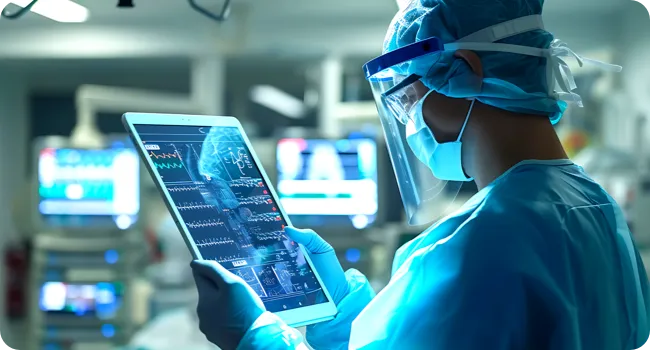Manual Communication Bottlenecks
Manual handling of patient inquiries led to delays and inefficiencies in response workflows.
The client is a prominent healthcare provider operating a digital platform that connects patients with medical resources, appointment scheduling, and healthcare professionals. With growing demand for digital healthcare services, they aimed to enhance patient engagement, streamline communication workflows, and improve operational efficiency across their platform.
They focus on delivering seamless, technology-driven care experiences while ensuring timely access to medical support for all users.

As a fintech company operating in a highly regulated industry, the client faced several challenges:
Manual handling of patient inquiries led to delays and inefficiencies in response workflows.
Patients experienced long wait times for responses, negatively impacting satisfaction and trust.
Staff were overwhelmed with repetitive tasks like answering FAQs, limiting time for complex patient cases.
Manual pre-consultation processes slowed down assessments, delaying necessary care delivery.
Inefficient workflows prolonged the time taken to resolve patient queries, affecting overall service quality.
Lack of real-time collaboration tools hindered effective coordination among healthcare professionals.
Binary Informatics developed a robust Generative AI-powered communication engine using an agile development model, integrating advanced technologies to directly address each business need:
A conversational AI chatbot was deployed using OpenAI’s GPT-4 and Dialogflow , enabling natural language understanding and automated handling of patient inquiries. This created seamless, intelligent interactions between patients and the platform.
Generative AI was utilized to provide instant, context-aware responses to patient queries, including automated FAQ handling and initial symptom checks, significantly improving engagement speed and accuracy.
UiPath-based robotic process automation (RPA) was implemented to handle routine administrative tasks such as scheduling and query categorization, allowing staff to focus on high-priority patient care.
An AI-powered triage system was integrated using TensorFlow-based models for symptom analysis and risk assessment. This enabled automated pre-consultation screenings, speeding up patient evaluations and reducing delays.
AWS Lambda was used to build an intelligent query routing system that directed inquiries to the appropriate healthcare professionals, ensuring faster and more accurate resolution.
Real-time collaboration capabilities were introduced via integration with the Microsoft Teams API , supported by MongoDB for storing interaction logs. This improved stakeholder coordination and ensured scalable teamwork.
The entire system was deployed on a cloud-native architecture using AWS (Lambda, EC2) and Microsoft Azure , ensuring high availability, scalability, and future-ready expansion.

The implementation of the Generative AI-powered communication engine delivered measurable improvements across key performance indicators:
Reduction in manual communication efforts
decrease in average response time
less time spent on repetitive tasks
Faster response to business needs
decrease in average response time
less time spent on repetitive tasks
These results significantly enhanced the client's service quality, patient satisfaction, and overall operational effectiveness.
The following technology stack was used to implement the DevOps solution:
Ready to start your digital transformation? Share your project details, and we’ll help bring your vision to life.
We Schedule a call at your convenience
We do a discovery and consulting
We prepare a proposal
Your Idea is 100% protected by our non disclosure agreement.